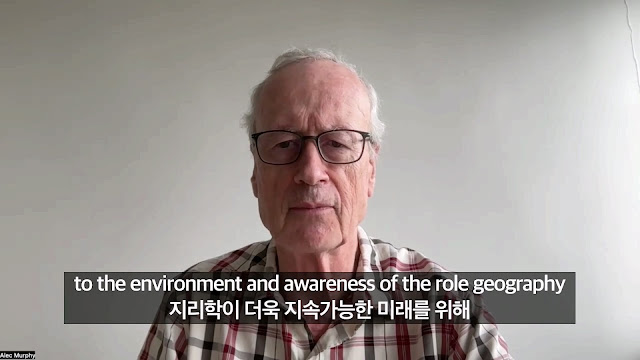We received special message from Prof. Alexander Murphy,
to celebrate World Environment Day 2025. (2025.06.04.)
2025 World Environment Day Special Message |
Prof. Alexander B. Murphy, World-Renowned Geographer
_______________________________________________________________
Alexander (Alec) Murphy is at the forefront of the movement to combat geographical illiteracy in the United States. A geography professor at the University of Oregon and winner of the university’s highest teaching award, Alec is Senior Vice-President of the American Geographical Society, a past president of the American Association of Geographers, and a frequent advisor on National Geographic education initiatives. Research, speaking invitations, and travel have taken him to more than 100 countries around the world. His published works include a popular world human geography textbook, a widely used treatise on the geography of Europe, and research articles on developments in the Middle East, East and Southeast Asia, Sub-Saharan Africa, and beyond. His recently completed book, Geography: Why It Matters (Polity, 2018), has been widely acclaimed for its role in promoting broader understanding of the nature and importance of geography.
Here is the book talk session presented by Elliss and Prof Eje Kim
for Alexander couldn't attend GG Summer School due to family funeral.
But he said he would attend 2025 GG Summer School and keep providing us the advice as a Senior mentor of GGS.
Here is a video message from Prof. Alexander Murphy. Thanks for his contribution.
Professor Murphy discusses how to view the world, relating to his book "Why Geography Matters" which presents a geographical perspective on understanding the world.









Hi, I'm Nahyun Kwon majoring French Studies at Yonsei University. In your work as an environmental expert, how do you see the role of geography in shaping both the causes of and responses to environmental challenges such as climate change or biodiversity loss? Given that environmental issues often play out differently depending on regional contexts—such as coastal vulnerability, land use patterns, or socio-economic conditions—how can a geographically-informed approach lead to more effective and equitable environmental solutions?
ReplyDeleteHello, this is Seojin Lee from the Department of Special Education at Gyungin National University of Education.
ReplyDeleteI heard that Chicago developed by concentrating resources from other regions through the railroad connecting the Great Plains, the Great Lakes, and the Atlantic Ocean. Seoul is also concentrating various geographical resources centered on the transportation network.
I think that the construction of this transportation network not only develops underdeveloped regions, but also transfers geographical advantages to more developed regions at a low cost.
I wonder which of the advantages and disadvantages of the construction of transportation networks in underdeveloped regions with distinct geographical characteristics you think is greater.
Hello, I’m Jaehyun Kim from Gyeongin National University of Education. Your career is really great and I want to emulate it. I want to ask you, a renowned geographer. There are various problems that are coming to the fore these days, such as environmental pollution and global warming. I am curious about the most problematic geographical problems or issues these days.
ReplyDeleteHello, I'm Na Young Kim from Kyungshin Girls' High School in Gwangju. Professor Na-young presented the seriousness of geographic illiteracy and said it is important to know about geography. What are the problems that can occur if geographic illiteracy becomes more severe, and what can be helpful in terms of social and national aspects if a broader understanding of geography is achieved?
ReplyDeletehello, I'm Yuna Kim from Sejong Global High school. I'm interested in politics. So, are there some correlations between geography and politics? There are many conflicts, wars, and conflicts in modern society. What does this mean geographically? And is there any influence of geography on these conflicts?
ReplyDeleteHi Yuna,
DeleteI'm not the professor. But I'm so keen on this topic that I was itching to reply. Geography does indeed affect strategy. Just look at the success of the Viet Cong or the Taliban!! If you want to talk further about this, I encourage you to leave a comment on my introduction page.
- Miro Ireson -- New Zealand friend!